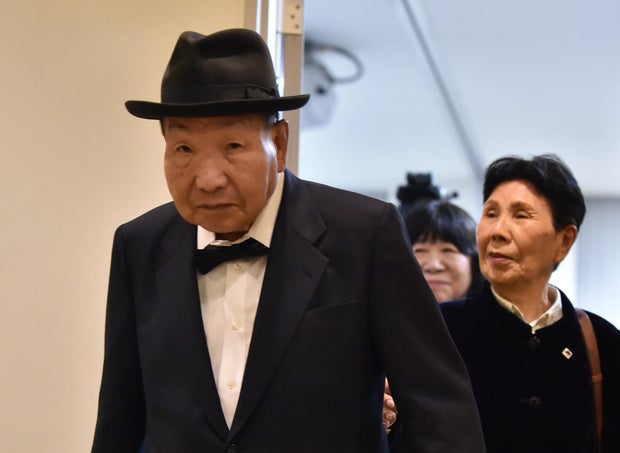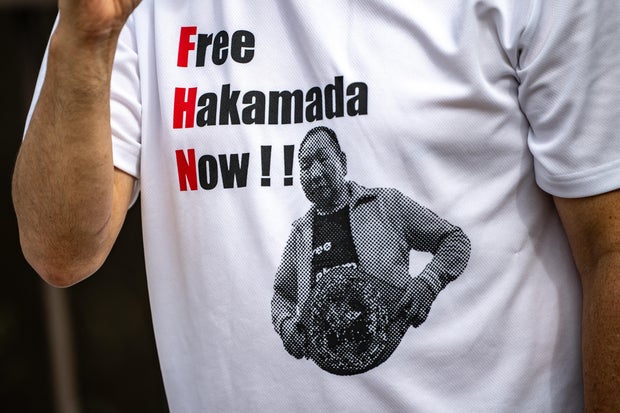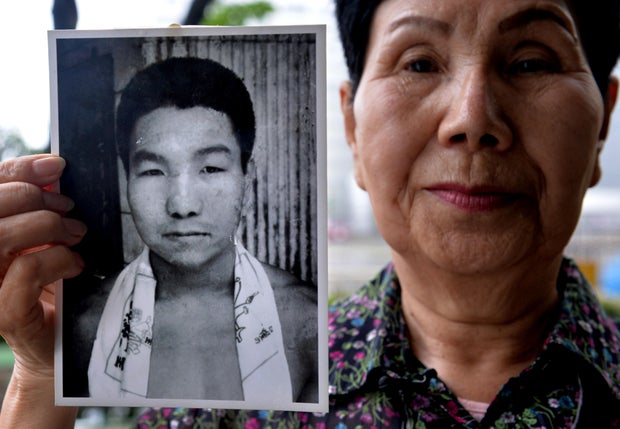The 88-year-old boxer – the world’s longest serving prisoner – was convicted of murder in 1966 in Japan.

A Japanese court on Thursday ruled an 88-year-old boxer not guilty in a retrial of the 1966 quadruple murder, overturning an earlier verdict that made him a world figure. the longest serving prisoner.
The release of Iwao Hakamada by the Shizuoka District Court making him the fifth death row inmate to be acquitted in a retrial in Japan’s post-war criminal justice system. The case could reignite the debate over the abolition of the death penalty in Japan.
The judge in charge of the court, Koshi Kunii, said that the court accepts that there is a lot of evidence and that Hakamada is not guilty, said Hakamada’s lawyer.
After a full two-hour explanation of the decision following the main sentence, the 91-year-old sister of Hideko Hakamada left the courtroom with a big smile, greeted with an explosion of joy and two large flowers to celebrate her acquittal. brother after a legal battle that lasted 58 years.
KAZUHIRO NOGI/AFP via Getty Images
“Thank you all, (the victory) thanks to your support,” he said. “Thank you so much for supporting us for so long.”
Hakamada was convicted of murder for killing a company manager and three members of his family in 1966, and setting fire to their home in central Japan. He was sentenced to death in 1968, but was not convicted because of the lengthy appeals and retrial process in Japan’s notoriously slow justice system where prosecutors have a 99% conviction rate.
He has spent 48 years in prison – more than 45 of which were on death row – making him the longest serving prisoner in the world, according to Amnesty International.
“We are very happy with the court’s decision to free Iwao Hakamada,” said Boram Jang of Amnesty International in a statement. “After enduring nearly half a century of illegal imprisonment and 10 years of waiting for his retrial, this verdict is an important recognition of the profound injustice he has endured for most of his life.”
It took 27 years for the high court to deny his first request for a retrial. His second request for a retrial was filed in 2008 by his sister. Hakamada was released from prison in 2014 when a court ordered a retrial based on evidence suggesting that his conviction was based on false accusations by investigators, but his conviction was not overturned. He was allowed to await retrial at home because his frail health and age made him a low risk of flight. Then in 2023, the court finally found in his favor, paving the way for the latest trial which started in October.
“I have nothing to do with this case … I am innocent,” he wrote in a letter to his mother during the 1967 trial. He apologized for bothering the family and relatives, but expressed confidence in proving his innocence.
After the death sentence, he expressed fear of death and anger at being falsely accused.
“When I sleep in a solitary cell with no sound every night, sometimes I can’t help but curse God. I have done nothing wrong,” he wrote to his family. “What a painful act of giving me such cruelty. We don’t need such a God. I am tempted to cry this out to God,” wrote Hakamada in one of his letters.
Hakamada, whose Christian name is Paulo, was invited to Mass in Tokyo during Pope Francis’ visit in 2019, five years after his release.
PHILIP FONG/AFP via Getty Images
Supporters say Hakamada’s nearly half-century in prison took a toll on his mental health. In the first two months after Hakamada’s release, he kept wandering around the apartment, without even trying to go outside, his sister said. Most of his 48 years in prison he was in solitary confinement, in fear of being killed.
One day, Hakamada’s sister asked him to help her with groceries so he would agree to leave the house. Going out for a walk became a regular occurrence for him, although today he is no longer strong and he goes out in a car, helped by his followers.
In the final hearing at the Shizuoka court in May before Thursday’s verdict, prosecutors again sought the death penalty, prompting criticism from rights groups as prosecutors tried to extend the case.
The high hurdles to trial have also prompted legal experts to call for an overhaul of the system.
During the investigation that followed his arrest, Hakamada first denied it, then admitted it. He later said he was forced to confess to the crime while being investigated by the police for violence.
At issue were five bloody pieces of clothing that investigators said Hakamada wore during the crime and hid in a tank of fermented soybeans, or miso. These clothes were found more than a year after he was incarcerated.
A decision by the Tokyo High Court in 2023 accepted a scientific test that clothes soaked in miso for more than a year turned too dark for blood spots to be seen, indicating that it could be done by investigators.
Defense attorneys and earlier rulings in the trial said blood samples did not match Hakamada’s DNA, and the pants prosecutors submitted as evidence were too small for Hakamada and did not fit when he tried them on.
“Groundbreaking” decision
On Thursday, a Shizuoka district court judge ruled that clothes soaked in miso for more than a year would never show blood-red stains, agreeing with tests presented by defense lawyers and calling it an “inhumane investigation” that led to a forced confession.
Ogawa, Hakamada’s lawyer, hailed the decision as “groundbreaking” for making it clear that prosecutors were building important evidence early on. “I believe that this decision ends this case. … Now we must prevent the prosecutors from appealing the case no matter what happens.”
The lawyer said that he plans to go to the district prosecutors and ask them not to appeal the case because technically they can do that even though they do not have the ability to appeal the case.
KAZUHIRO NOGI/AFP via Getty Images
Japan and the United States are the only countries in the Group of Seven developed countries that retain the death penalty. A study conducted by the Japanese government showed that most of the people killed were supported by the public.
The executions were carried out in secret in Japan and the prisoners were not informed of their fate until the morning of the hanging. In 2007, Japan began releasing the names of those killed and other details of their crimes, but disclosure remains limited.
According to Amnesty International, as of December 31, 2023, 107 of the 115 people on death row have completed their death sentences and “those on death row continue to be held in solitary confinement.”
Hideko Hakamada dedicated almost half of her life to win her brother’s innocence. Before Thursday’s decision, he said he was in an endless battle.
“It is very difficult to start a new trial,” he told reporters in Tokyo. “Not only Iwao, but I’m sure there are other people who are wrongly accused and who are complaining. … I want the criminal law to be revised so that the trial process can be easily found again.”
Source link







